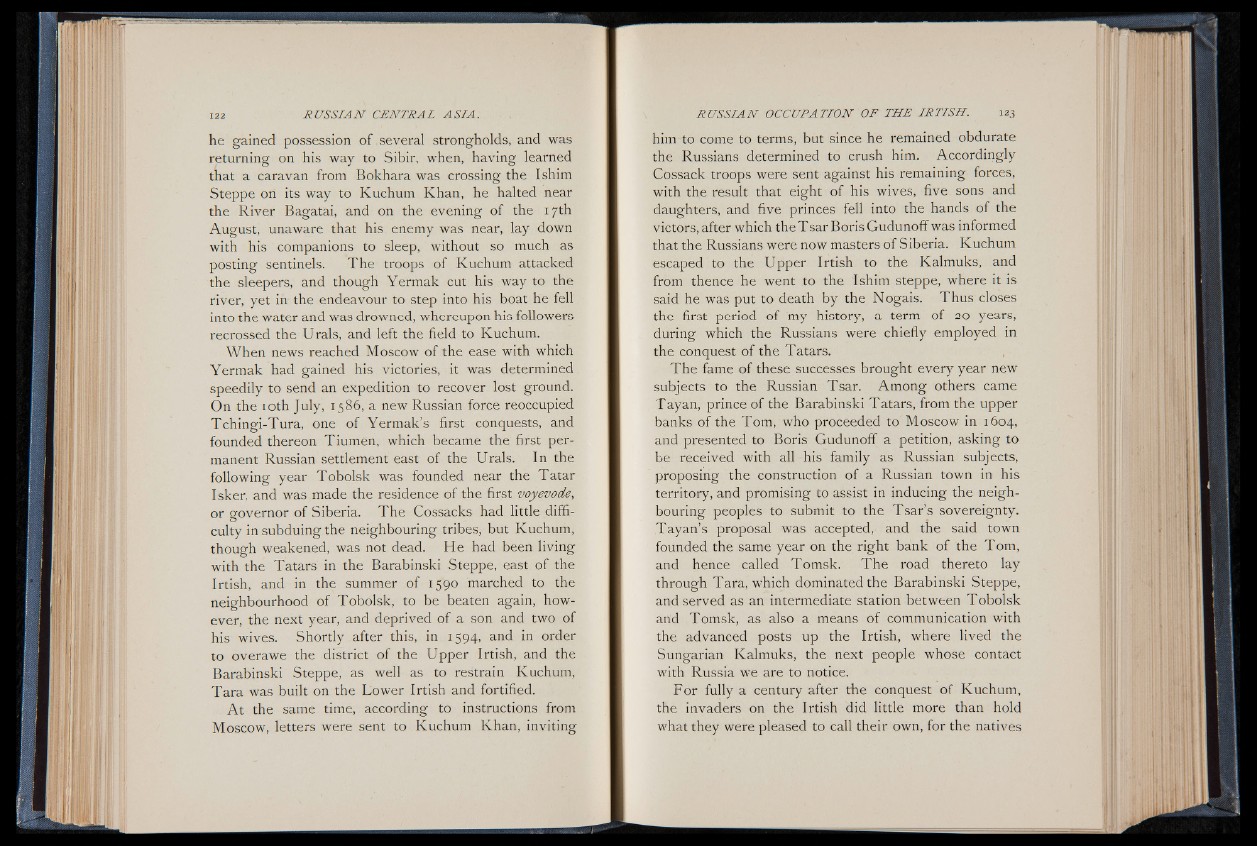
he gained possession of several strongholds, and was
returning on his way to Sibir, wrhen, having learned
that a caravan from Bokhara was crossing the I shim
Steppe on its way to Kuchum Khan, he halted near
the River Bagatai, and on the evening of the 17th
August, unaware that his enemy was near, lay down
with his companions to sleep, without so much as
posting sentinels. The troops of Kuchum attacked
the sleepers, and though Yermak cut his way to the
river, yet in the endeavour to step into his boat he fell
into the water and was drowned, whereupon his followers
recrossed the Urals, and left the field to Kuchum.
When news reached Moscow of the ease with which
Yermak had gained his victories, it was determined
speedily to send an expedition to recover lost ground.
On the 10th July, 1586, a new Russian force reoccupied
Tchingi-Tura, one of Yermak’s first conquests, and
founded thereon Tiumen, which became the first permanent
Russian settlement east of the Urals. In the
following year Tobolsk was founded near the Tatar
Isker. and was made the residence of the first voyevode,
or governor of Siberia. The Cossacks had little difficulty
in subduing the neighbouring tribes, but Kuchum,
though weakened, was not dead. He had been living
with the Tatars in the Barabinski Steppe, east of the
Irtish, and in the summer of 1590 marched to the
neighbourhood of Tobolsk, to be beaten again, however,
the next year, and deprived of a son and two of
his wives. Shortly after this, in 1594, and in order
to overawe the district of the Upper Irtish, and the
Barabinski Steppe, as well as to restrain Kuchum,
Tara was built on the Lower Irtish and fortified.
A t the same time, according to instructions from
Moscow, letters were sent to Kuchum Khan, inviting
him to come to terms, but since he remained obdurate
the Russians determined to crush him. Accordingly
Cossack troops were sent against his remaining forces,
with the result that eight of his wives, five sons and
daughters, and five princes fell into the hands of the
victors, after which the Tsar Boris Gudunoff was informed
that the Russians were now masters of Siberia. Kuchum
escaped to the Upper Irtish to the Kalmuks, and
from thence he went to the Ishim steppe, where it is
said he was put to death by the Nogais. Thus closes
the first period of my history, a term of 20 years,
during which the Russians were chiefly employed in
the conquest of the Tatars.
The fame of these successes brought every year new
subjects to the Russian Tsar. Among others came
Tayan, prince of the Barabinski Tatars, from the upper
banks of the Tom, who proceeded to Moscow in 1604,
and presented to Boris Gudunoff a petition, asking to
be received with all his family as Russian subjects,
proposing the construction of a Russian town in his
territory, and promising to assist in inducing the neighbouring
peoples to submit to the Tsar’s sovereignty.
Tayan’s proposal was accepted, and the said town
founded the same year on the right bank of the Tom,
and hence called Tomsk. The road thereto lay
through Tara, which dominated the Barabinski Steppe,
and served as an intermediate station between Tobolsk
and Tomsk, as also a means of communication with
the advanced posts up the Irtish, where lived the
Sungarian Kalmuks, the next people whose contact
with Russia we are to notice.
For fully a century after the conquest of Kuchum,
the invaders on the Irtish did little more than hold
what they were pleased to call their own, for the natives